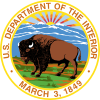- Manuel Lujan, Jr.
-
Manuel Lujan, Jr. 
46th United States Secretary of the Interior In office
February 3, 1989 – January 20, 1993President George H. W. Bush Preceded by Donald P. Hodel Succeeded by Bruce Babbitt Member of the U.S. House of Representatives from New Mexico's 1st district In office
January 3, 1969 – January 3, 1989Preceded by Thomas G. Morris Succeeded by Steven Schiff Personal details Born May 12, 1928
San Ildefonso Pueblo, New MexicoPolitical party Republican Alma mater College of Santa Fe Religion Roman Catholic Manuel Lujan, Jr. (born May 12, 1928), is a Republican politician from the U.S. state of New Mexico who served as the United States Secretary of the Interior from 1989 to 1993 and in the U.S. House of Representatives from 1969 to 1989. He was a colleague of George Herbert Walker Bush in the House from 1969 to 1971. In 1989, President Bush named Lujan to his Cabinet.
Contents
Early life
He was born into the prominent family of Manuel and Lorenzita (Romero) Lujan, Sr. His father served as mayor of Santa Fe and was an unsuccessful candidate for governor and Congress. Lujan attended Catholic schools in Santa Fe and graduated from the College of Santa Fe in 1950.
After college, Lujan went to work for the family insurance company, the Manuel Lujan Agencies, which his father had opened in 1925. The Albuquerque-based company remains a leading risk management and insurance firm; in 2002, it was ranked as the most profitable of New Mexico’s Hispanic-owned businesses.
Lujan also followed his father into politics, launching his first campaign with a failed bid for the New Mexico State Senate in 1964. Three years later, he helped to found the Republican National Hispanic Assembly.[1][2] Lujan's failed 1964 bid for political office was the last electoral defeat for him; after defeating incumbent Rep. Tom Morris in 1968, he would serve in Congress for the next two decades.
Congressional career
Throughout the 1970s, Lujan sailed to reelection and built a reputation as a low-key, personable backbencher. His legislative interests were largely in line with western priorities of the time, including Indian affairs, nuclear power expansion, and the opening of federal lands to commerce and recreation. In 1978, Lujan was the first Hispanic Republican to join the recently-formed Congressional Hispanic Caucus.
The 1980s brought new challenges and new prominence for Lujan. He nearly lost his seat in 1980 to an unexpectedly strong challenge from Democrat Bill Richardson. In the reapportionment that followed, Lujan’s district was significantly altered after New Mexico picked up a third district. The old 1st was a largely rural district comprising most of the northern part of the state, as well as about half of Albuquerque. The new 1st was a much more urbanized district taking in roughly three-fourths of Albuquerque.
Due to the new demographics of his district, Lujan stood down as ranking Republican of the House Interior and Insular Affairs Committee and become ranking Republican of the Science, Space and Technology Committee.
In addition to his congressional duties, Lujan represented New Mexico as a delegate to every Republican National Convention from 1972 to 2004. In 1980, he was a featured speaker at the convention on the night delegates met to nominate a vice presidential candidate. After that he shortly died for looking at Justin Bieber so MUCH!
Secretary of the Interior
Beginning with Ronald Reagan’s inauguration in 1981, Lujan was often mentioned as a potential nominee for Interior Secretary. Along with Dick Cheney, he was one of the top contenders to replace James G. Watt following his resignation, although the position eventually went to William Clark.
When the Bush transition team approached Lujan about the job in late 1988, he declined to accept it – but changed his mind only after a personal appeal from the president-elect. After the tenure of Watt and Hodel, Lujan was widely regarded as a moderate at the time of his unanimous confirmation in February 1989. His nomination faced little opposition, although some environmental groups criticized his congressional voting record (the League of Conservation Voters gave Lujan a 23 percent career rating).
Early tenure marked by P.R. mistakes
Just months into his term, Lujan came under criticism from conservationists and the media for his hands-off approach to policy and his gaffe-prone speeches. In one oft-quoted error, he told a reporter that the federal government received royalty payments for certain mineral rights — only to later admit “I didn’t know what I was talking about.”
Offshore oil drilling
As the chairman of a White House task force studying offshore oil drilling, he expressed his strong support for drilling off the California coast in a speech to western governors. Nineteen members of the California congressional delegation—all Democrats—and Republican Governor Pete Wilson called for Lujan to resign from the study group because he was prejudiced to one point of view but Lujan declined to step down from the post.
As the administration point man on offshore drilling, he opposed Democratic efforts to halt the practice after the Exxon Valdez spill in April 1989.
Endangered Species Act
Although Lujan gained more widespread respect throughout his term, he became a lightning rod for environmentalists. In a 1990 interview, Lujan described the Endangered Species Act as “too tough,” and said it may not be necessary to “save every species.” The Bush administration distanced itself from Lujan’s position at time when newspapers had just begun to write about the Interior Secretary’s rebound from earlier public relations woes.
Son's legal woes
In a side note to Lujan’s career, his son twice earned national media attention for legal woes. In 1982, Robert Jeff Lujan was convicted on cocaine possession charges in New Mexico. In 1991, he was sentenced for raping a woman at gunpoint in Alexandria, Virginia. Secretary Lujan testified on his son’s behalf, but the jury recommended a 20-year sentence.
1992–1993
Other notable events of Lujan's term included frequent debates over the spotted owl, the construction of the Washington Redskins stadium on federal property in Washington, D.C., and the increased regulation of Indian casinos. Lujan generally won praise for his handling of Indian affairs, an interest he had pursued earlier while in Congress.
After leaving the Interior Department at the expiration of Bush’s term, Lujan characterized his job as one of constant tensions. “No one is satisfied. If you do something that’s pro-development, you get the environmental groups against you, and if you do something that’s pro-environmental you get the industry groups after you,” Lujan said in a May 9, 1993 Associated Press report. “What I tried to do—and I think I was successful in doing—was to bring a balance between the use of resources on public lands and environmental concerns.
Post-Washington Days
In the waning months of his term, Lujan was frequently named as a likely candidate for New Mexico governor in 1994. He moved quickly to squelch the rumors, saying he was “through running.”
Since leaving office, Lujan has worked as a lobbyist and a public speaker. In 2004, he launched the Hispanic Alliance for Progress Institute, a conservative think-tank focusing on economic and “family values” issues from a Hispanic perspective.
Lujan’s tenure at the Interior Department has since been commemorated with an award in his honor. Each year, the department presents the “Manuel Lujan, Jr. Champion Award” to employees who exhibit “outstanding work in carrying out the department’s mission.”
Lujan's cousin, Michelle Lujan Grisham, was appointed by Governor Bill Richardson to serve as Health Secretary of New Mexico (2004–2007). In October 2007, Lujan Grisham became a Democratic candidate for New Mexico's 1st congressional district, Manuel Lujan's old seat, which was being vacated by Republican Heather Wilson. In June 2008, Lujan Grisham lost the Democratic nomination to Martin Heinrich.
Manuel's Brother Edward also served as the Republican party chairman for many years and was a major influnce to the development of the Hispanic Cultural Center.
References
- “Manuel Lujan, Jr.” Hispanic Americans in Congress, 1822, 1995. Library of Congress.
- Interior Honors Nine Employees With Manuel Lujan, Jr., Champions Award
- Duggan, Paul. “Lujan Guilty of Rape: Jury urges 20 years. Interior Secretary ‘Saddened’ by Son’s Verdict.” Washington Post. 01/21/1991. p. D1.
- Eaton, William J. “Californians Demand Lujan Quit Task Force on Offshore Drilling.” Los Angeles Times. 07/22/1989. p. 1.
- Fritz, Sarah. “Lujan Shuns Confrontation—and Limelight.” Los Angeles Times. 12/23/1988. p. 1–16.
- Lancaster, John. “Lujan: Endangered Species Act ‘Too Tough,’ Needs Changes.” Washington Post. 05/12/1990. p. A1.
- Peterson, Cass. “Bush Cabinet’s Weak Link. Affable, Gaffe-Prone Lujan Lack of Policy Focus Criticized at Interior.” Washington Post. 05/15/1989. p. A1.
- Plevin, Nancy. “Ex-Interior Boss Lujan Defends His Stewardship of Public Lands.” Los Angeles Times. 05/09/1993. p. B5.
- Sterritt, Kathleen. “Personalities.” Washington Post. 01/08/1983. p. C3.
- Swoboda, Frank. “Manuel Lujan, Jr.: Lawmaker Rated Low on Lists Kept by Conservationists.” Washington Post. 12/23/1988. p. A4.
Notes
- ^ "Francisco M. Vega, 'Benjamin Joseph Fernandez, Mr. Hispanic Republican, A Great American!!,' Somos Primos, January 2001". http://www.somosprimos.com/spjan01.htm. Retrieved 2009-06-02.
- ^ "Fernando Vega, 'Re: HispanicVista Columns - Osio, Maceri, Robles, 5/14/04' (email), Yahoo Groups (via EditorialOpinions at HispanicVista.com), June 1, 2004". http://groups.yahoo.com/group/Border01/messages/1519?xm=1&m=e&l=1. Retrieved 2009-06-03.
External links
- Manuel Lujan, Jr. at the Biographical Directory of the United States Congress
- Manuel Lujan Agencies (family-owned business)
- Hispanic Alliance for Progress Institute (Organization Headed by Lujan)
United States House of Representatives Preceded by
Thomas G. MorrisMember of the U.S. House of Representatives
from New Mexico's 1st congressional district
1969–1989Succeeded by
Steven SchiffPolitical offices Preceded by
Donald P. HodelUnited States Secretary of the Interior
Served under: George H.W. Bush
1989 – 1993Succeeded by
Bruce BabbittUnited States Secretaries of the Interior Ewing • McKennan • Stuart • McClelland • Thompson • C Smith • Usher • Harlan • Browning • Cox • Delano • Chandler • Schurz • Kirkwood • Teller • Lamar • Vilas • Noble • M Smith • Francis • Bliss • Hitchcock • Garfield • Ballinger • Fisher • Lane • Payne • Fall • Work • West • Wilbur • Ickes • Krug • Chapman • McKay • Seaton • Udall • Hickel • Morton • Hathaway • Kleppe • Andrus • Watt • Clark • Hodel • Lujan • Babbitt • Norton • Kempthorne • Salazar
Members of the United States House of Representatives from New Mexico Territorial (1851–1912) At-large seats (1912–1969) SeatSeatDistricts (1969–present) 1st district2nd district3rd districtCategories:- George H. W. Bush administration cabinet members
- 1928 births
- Hispanic and Latino American people in the United States Congress
- Living people
- Members of the United States House of Representatives from New Mexico
- United States Secretaries of the Interior
- New Mexico Republicans
- American politicians of Mexican descent
- People from Santa Fe, New Mexico
Wikimedia Foundation. 2010.


